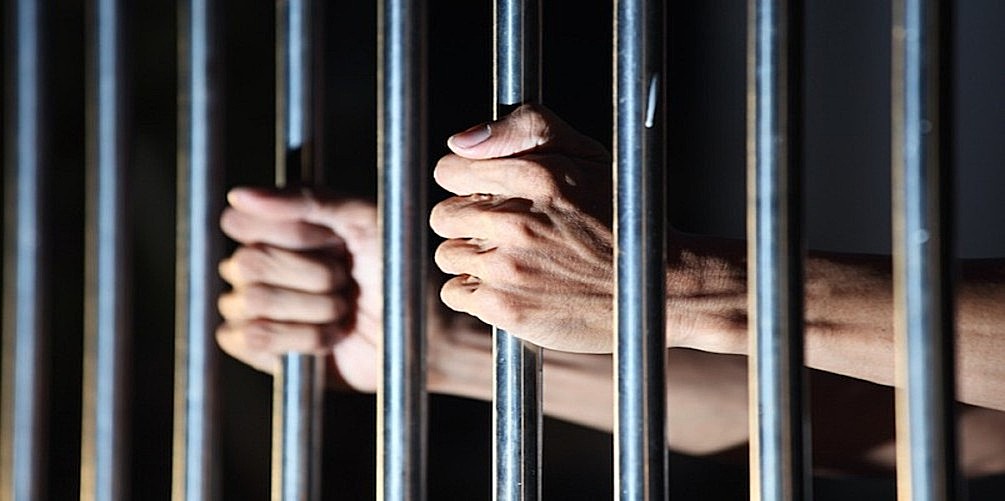
Next month is not only a new year but it also is when a new power-sharing reality will begin in Washington D.C. Speculation is rampant as to what this new reality will mean, bipartisan warfare or bipartisan productivity? But there is one person in a unique position to give a powerful and daring jumpstart to 2019 bipartisan productivity. The question is will he choose continued partisan warfare or bipartisan productivity?
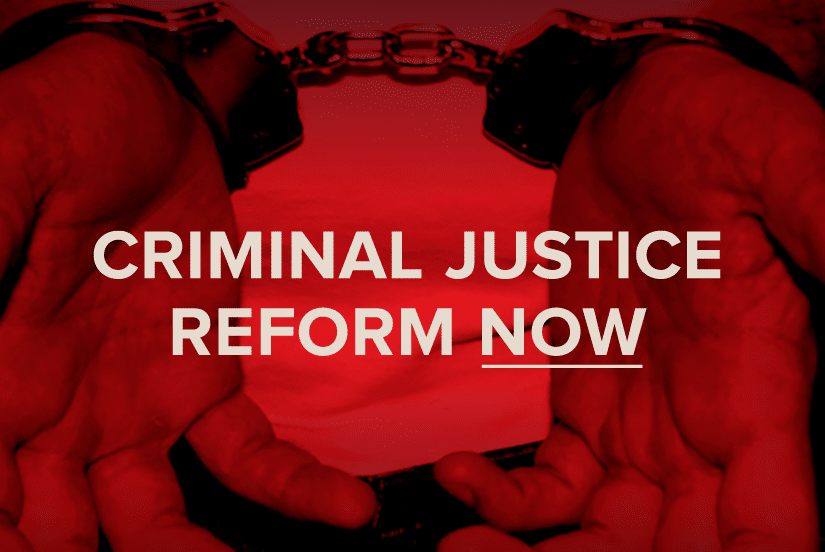
The person in the unique position to give a powerful and daring jumpstart to bipartisan productivity is Senate Majority Leader Republican Mitch McConnell. Senator McConnell has the sole authority to decide if a bill passed in the House, H.R. 5682 The First Step Act, a law that would literally take modest first steps towards total criminal justice reform, will come to the floor of the Senate for an up or down vote.
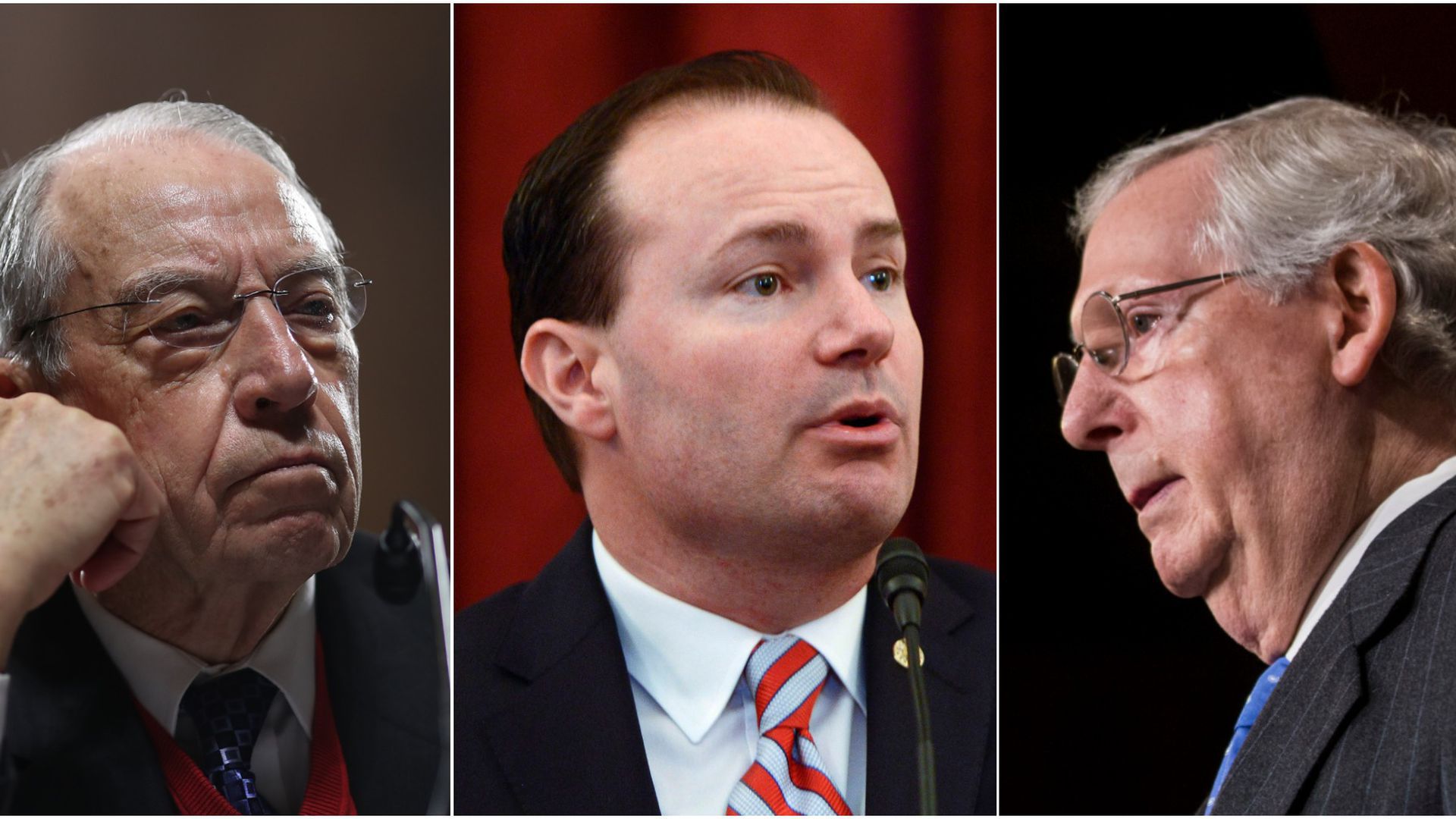
Sens. Chuck Grassley (left), Mike Lee (center) along with Lindsey Graham and Tim Scott, 4 of the most conservative members in the Senate, are all pressuring Senate Majority Leader Mitch McConnell (right) to move forward with a vote on a bipartisan criminal justice reform bill before the end of the year. Photos: Getty Images
So far Senator McConnell has a track record of partisan warfare as opposed to bipartisan productivity in the area of criminal justice reform. In 2015 a fellow Republican, Senator Chuck Grassley Chairman of the Senate Judiciary Committee, introduced the Sentencing Reform and Corrections Act (SRCA). The Senate Judiciary Committee not known for its bipartisan productivity passed the bill out of committee with a strong bipartisan vote. Unfortunately, that act of bipartisan productivity on criminal justice reform ended there because Senator McConnell refused to call a vote on the bill, allegedly because he feared it would divide his Republican Caucus.
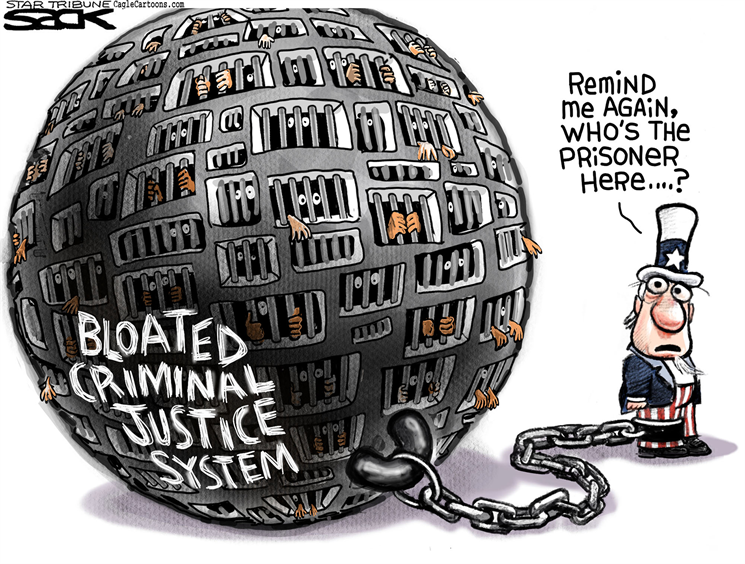
The #2 in the Senate, Republican John Cornyn a reform supporter, conceded then that the 2016 election politics influenced McConnell’s decision. Now that the 2016 Presidential election and the 2018 mid-term elections are over, Senator McConnell is free to choose bi-partisan productivity over partisan warfare.
GOP colleagues: NOW is time to pass crim justice reform unless your argument is that you prefer to work w Speaker Nancy Pelosi to pass a bill? Pres Trump has golden opportunity to pass historic bipartisan bill that Pres Obama couldn’t #PassFirstStep
— ChuckGrassley (@ChuckGrassley) November 16, 2018
Chuck Grassley one of the most conservative members of the Senate is really pushing his fellow Republican Mitch McConnell to allow a vote on criminal justice reform
Bipartisan productivity appears to be President Trump and Republican Senator Chuck Grassley’s choice on criminal justice reform. President Trump’s 2016 law and order campaign rhetoric has given way to full-blown support of the First Step Act. After it was reported that Senator McConnell said he didn’t think a vote likely on the First Step Act this year, Senator Grassley tweeted “Will GOP senators & Ldr McConnell stand in Pres Trump’s way of achieving major bipartisan victory?”
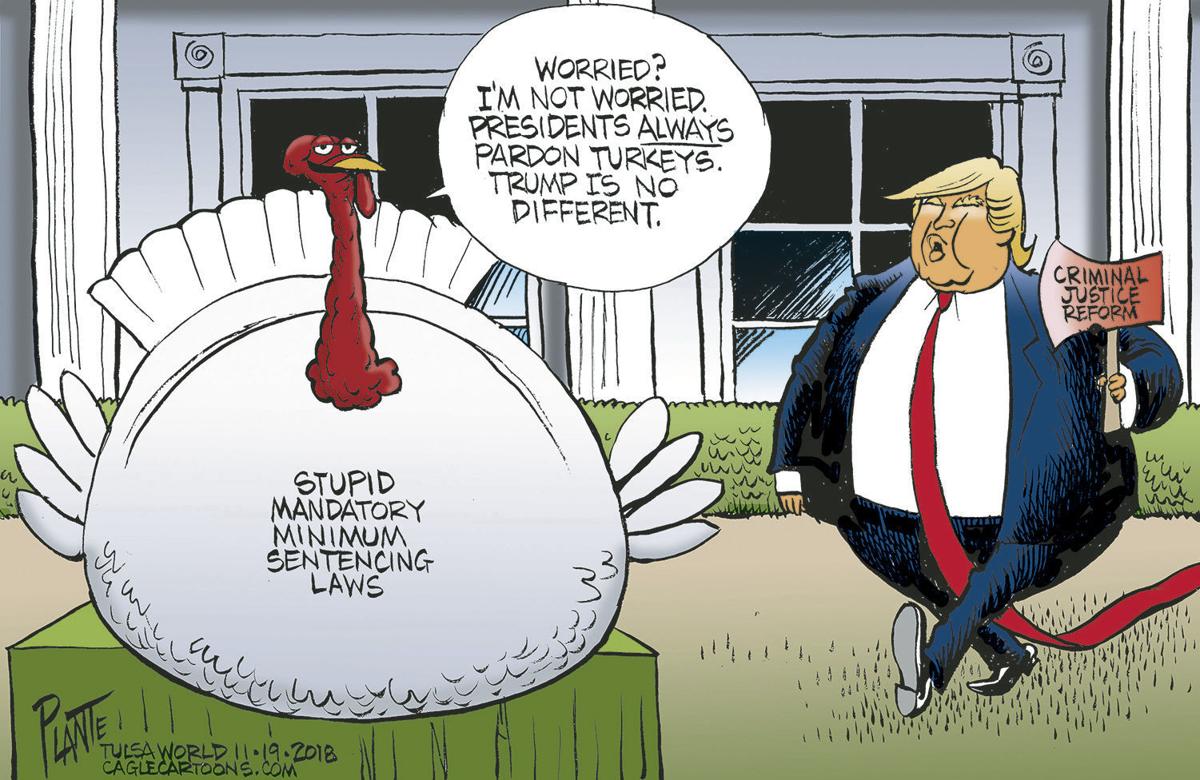
Even though President Trump campaigned using a lot of conservative law and order rhetoric, he wants the Senate to vote and pass the First Step Act into law
The First Step Act bill amended and passed out of the Senate Judiciary Committee by a bipartisan productivity vote, is the bill that McConnell will decide whether or not it comes to the Senate floor for a vote. It adds changes to the prison overhaul bill already passed overwhelmingly by a House bipartisan productivity vote. A bipartisan group of Senators that included Democrat Senator Dick Durbin and Republican Senator Grassley, reached a bipartisan productivity deal that rewrote the nation’s sentencing and prison laws drawing the support of the remaining hold-out liberal and conservative critics of the House bill.
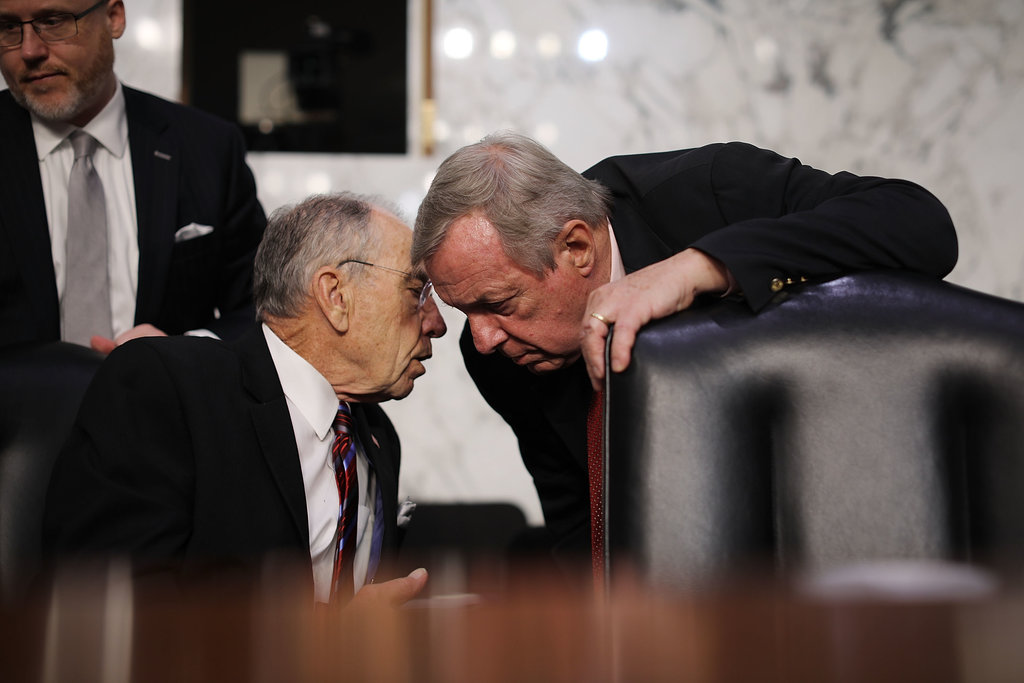
Senators Charles E. Grassley (left), a Republican, and Richard J. Durbin (right), a Democrat, lead the bipartisan effort in the Senate for prison sentencing overhaul. Chip Somodevilla/Getty Images
The left wants to reform the criminal justice system because of the racial discrimination applied to the poor and people of color, and because of the harshness of sentences given for non-violent crimes. The right wants to reform the criminal justice system because of the high cost of applying discriminatory justice to the poor and people of color, and for the high cost of long sentences for non-violent crimes.

FreedomWorks, an influential conservative advocacy group that backs the First Step Act, posted a telephone number for Mr. McConnell and urged followers on Twitter to call on him to let the Senate vote on criminal justice reform
A cost example from the right is the State of Texas. In 2007 Texas was already spending close to $3 billion dollars a year on prisons and parole, then Governor Rick Perry was given a projection that in order to meet future criminal justice needs, Texas would need an additional 17,000 prison beds at a cost of an additional $2 billion dollars. Gov. Perry knew an alternative needed to be found.
According to Gov. Perry with broad support from Republican and Democratic state legislators, in other words, bipartisan productivity, Texas fundamentally changed its course on criminal justice. It focused on diverting people with drug addiction issues from entering prison in the first place, and programs to keep them from returning.
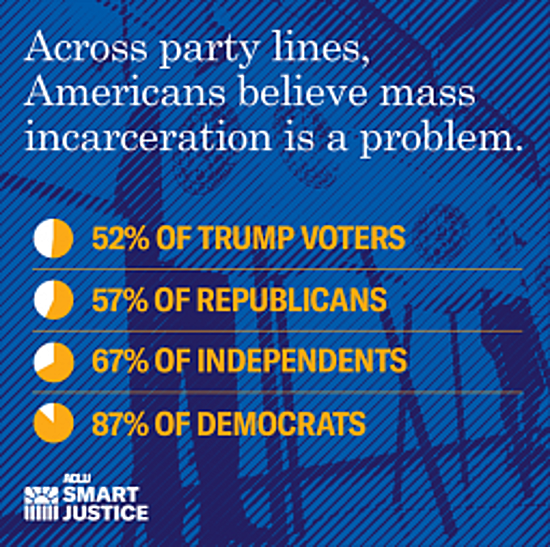
The American Civil Liberties Union Campaign for Smart Justice has released public opinion polling data that shows consensus support for criminal justice reform across the ideological and political spectrum.
First, Texas expanded its commitment to drug courts that would allow certain low-level offenders to stay out of prison if they agreed to comprehensive supervision, drug testing, and treatment. Drug courts with increased funding were added to more counties, and the types of crimes that allowed a defendant to enter drug courts were expanded. Rather than languishing in a cell, first-time, nonviolent offenders willing to confront their drug addiction are connected with counseling and undergo intense supervision, including weekly random drug tests and meeting with a probation officer. These programs have shown some success. The National Association of Drug Court Professionals found that about 75 percent of people who complete drug court programs do not recidivate.

States are discovering that it saves money for them and produces better health outcomes for individuals to treat non-violent drugs offenses as public health issues instead of criminal abuses of the law
Second, Texas reformed its approach to parole and probation. It focused financial resources on rehabilitation so it could ultimately spend less money locking prisoners up again. It invested $241 million to create treatment and rehabilitation programs to address drug addiction and mental illness for people on parole and probation. Rather than immediate re-incarceration for minor violations of parole or probation conditions, Texas introduced a system of progressively increasing punishments, or “graduated sanctions.” If people committed violations because of drug or mental health issues, it addressed those issues instead of simply locking them up again by adding more residential and outpatient beds for substance abuse treatment. Texas also added more beds in halfway houses that provided reentry services and provided more substance abuse programs in prisons and jails.
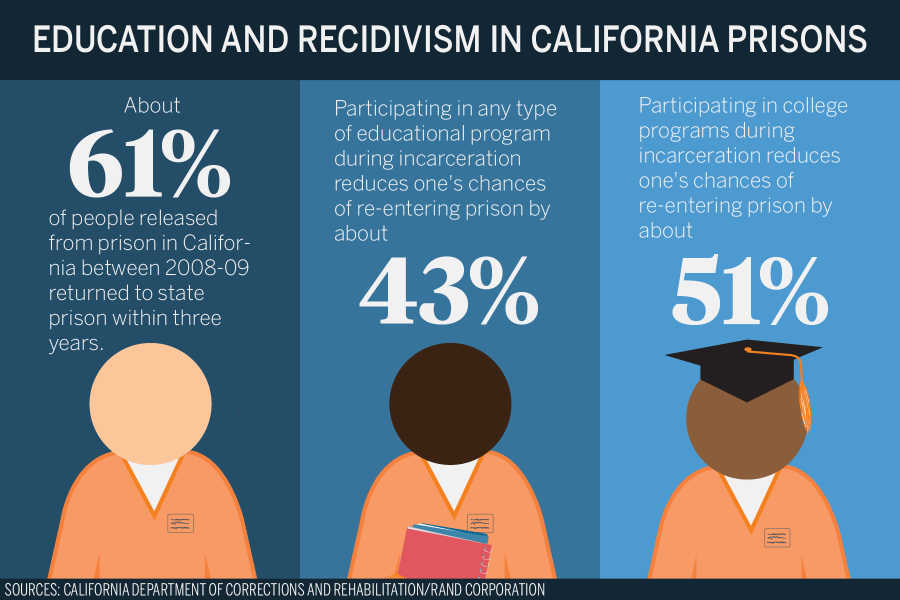
A study conducted by a UC Berkeley professor found that individuals sentenced to prison rather than probation were more likely to re-enter the prison system.
And finally, Texas shifted its focus from volume to outcomes. It offered financial incentives to local probation departments. The parole departments could win additional state funds if they reduced the number of probationers returning to prison by 10 percent by implementing the graduated sanctions approach. Most departments accepted this challenge, and the number of new crimes committed by probationers substantially decreased across the state.
Thanks to bipartisan productivity Gov. Perry and Texas implemented these reforms in 2007. By the time he left office in 2015, Texas had expanded the number of specialty courts in the state from nine to more than 160. It reduced the number of parole revocations to prison by 39 percent and saved $2 billion dollars. All of this was done while Texas’s crime rate dropped to its lowest point since 1968, and for the first time in Texas history, instead of Texas building new prisons, it shut down three and closed six juvenile facilities.
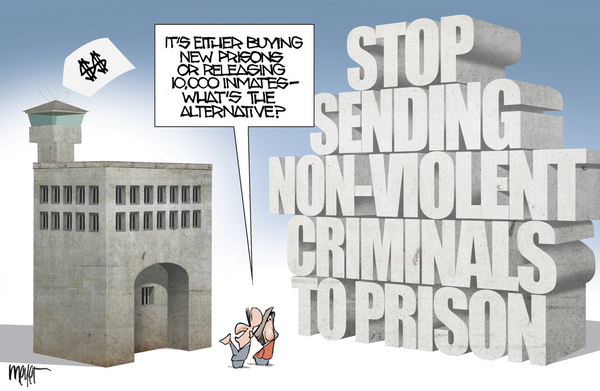
This same success story can be repeated on the federal level throughout America if Sen. McConnell would choose bipartisan productivity and let the First Step Act come to the Senate floor for a vote. A vote of bipartisan productivity to pass the First Step Act would produce 5 key reform measures to America’s criminal justice system:
Judicial Latitude
Federal Judges would have the latitude not to impose mandatory minimum sentences and to impose lighter drug sentences if they feel circumstances of the case merit it. Currently, Judges can sidestep mandatory minimum sentences for a nonviolent drug offender with a minimal criminal history. A provision of both the Sentencing Reform Act and the United States Federal Sentencing Guidelines known as the safety valve allows them the discretion to do so. The First Step Act proposes expanding the safety valve to include offenders with a higher record of criminal history. This could have a significant effect on American Blacks, who traditionally have faced much higher incarceration rates on drug crimes than white offenders.

The First Step Act starts the process of preventing the heavy hand of the law from disproportionally abusing people of color
No More 3 Strikes For Life
The 3 strikes penalty that calls for offenders to face life in prison after committing a third crime would be eliminated under the First Step Act. It has long been criticized because it can result in an inmate serving a life sentence for three minor, nonviolent crimes. The current sentence of life after 3 strikes would be reduced to 25 years, and the category of offenders who could receive the 3 strikes penalty would be significantly narrowed.
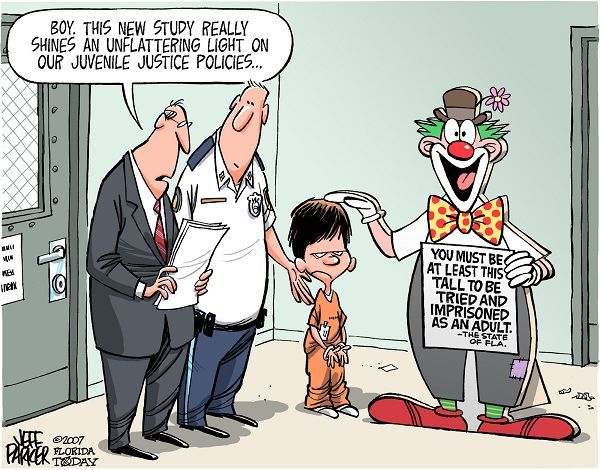
No More Stacking For First Time Offenders
Under current law, if a first-time offender uses a firearm in connection with other federal crimes, such as drug trafficking, their sentence could increase an additional five to 25 years for each offense. Those who support changing stacking point to Weldon H. Angelos, who at age 25 was sentenced to 55 years in prison for being in possession of a firearm when he was caught selling small bags of marijuana to a police informant.
The End Of Racially Unfair Sentencing
For years, a sentencing disparity has existed that has disproportionately sentenced black people to longer periods of incarceration for crack cocaine offenses than white people charged with powder cocaine offenses. In 2010 a law was passed to address the sentencing disparity between crack cocaine offenders and powder cocaine offenders, unfortunately, it only applied to cases that occurred after the law was passed. Under the First Step Act, it would be applied retroactively, covering inmates incarcerated for crack cocaine offenses before the law was passed in 2010.
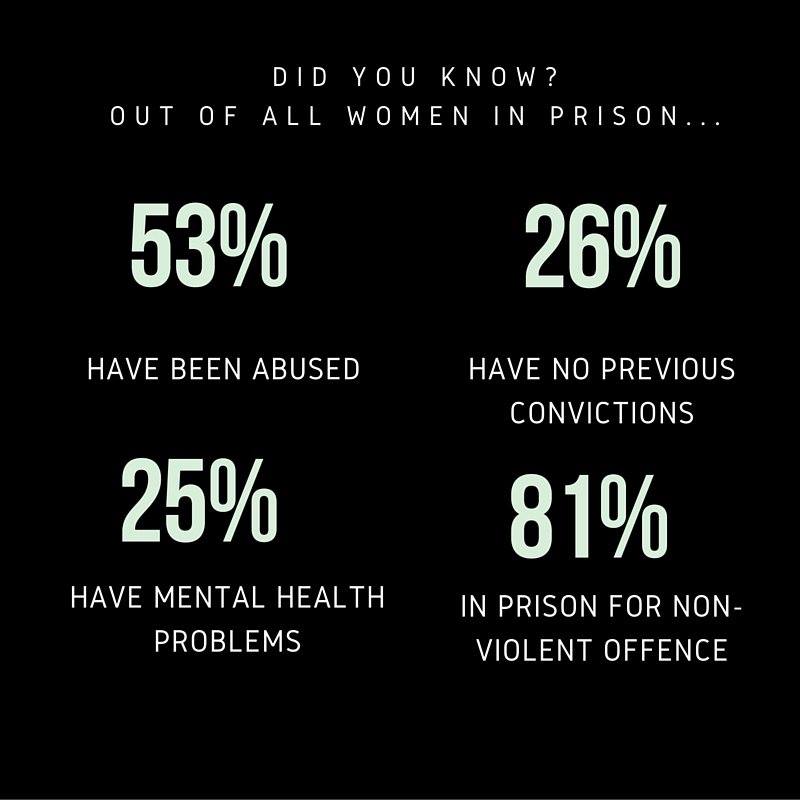
Source: The Corston Report 2017
No More Shackles
For years human rights advocates have protested examples of female inmates being shackled while they were pregnant. The First Step Act will prevent corrections officers from restraining pregnant inmates with shackles.
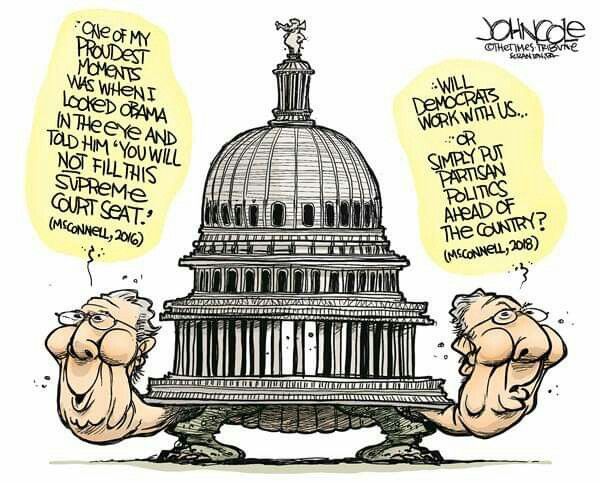
If Senator Mitch McConnell truly wants Democrats to work with Republicans, he will set the political tone of bipartisan productivity for 2019 by allowing a vote on criminal justice reform in 2018
Republican Senate Majority Leader Mitch McConnell is in the unique position of setting the political tone of 2019. He can choose to continue partisan warfare or make a daring move to jumpstart bipartisan productivity. Allowing a vote on the First Step Act now with such strong bipartisan support from President Trump, Democrats, and Republicans would provide good practice at passing bipartisan productivity legislation. It would also send a signal to incoming House majority Democrats that legislative compromise and achievement is possible with Senate Republicans. Senator McConnell, please stop fostering partisan warfare, step aside and allow the First Step Act to proceed to the Senate floor for a vote and let BIPARTISAN PRODUCTIVITY BEGIN!!!



